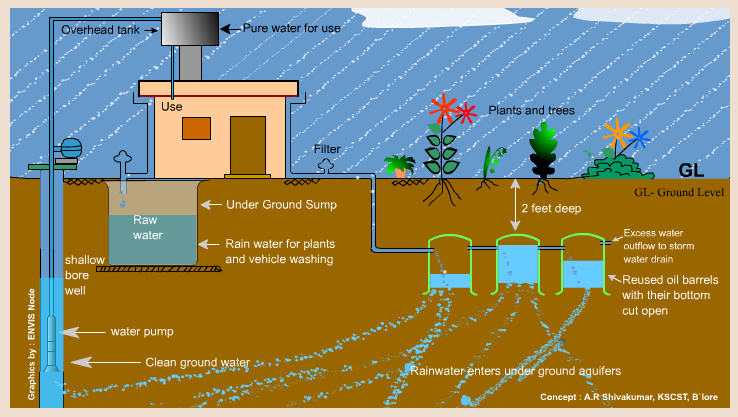Water is our most precious natural resource and something that most of us take for granted. We are now increasingly becoming aware of the importance of water to our survival and its limited supply, especially in such a dry continent as Australia.
The harvesting of rainwater simply involves the collection of water from surfaces on which rain falls, and subsequently storing this water for later use. Normally water is collected from the roofs of buildings and stored in rainwater tanks. This is very common in rural Australia. Water can also be collected in dams from rain falling on the ground and producing runoff.
Either way, the water collected can be considered to be precious.

- In Bangalore it is mandatory for adoption of RWH for every owner or the occupier of a building having the sital area measuring 60’X40’ and above and for newly constructed building measuring 30’X40’ and above dimension. In this regard BWSSB has initiated and constructed “Rain Water Harvesting Theme Park” in the name of Sir. M. Visvesvaraya in 1.2 acre land situated at 40th cross, 8th main, 5th block Jayanagar Bangalore-41. In this park 26 different type of Rain Water Harvesting models are demonstrated along with the Water conservation tips for inside and outside the main building. The Auditorium on the first floor is set up with Green Air conditioning system and the same will be utilised to arrange the meeting and showing the video clip about the RWH to the Students as well as general public.
- In the state of Tamil Nadu, rainwater harvesting was made compulsory for every building to avoid groundwater depletion. It gave excellent results within five years, and every state took it as role model. Since its implementation, Chennai saw a 50 percent rise in water level in five years and the water quality significantly improved.
- In Rajasthan, rainwater harvesting has traditionally been practiced by the people of the Thar Desert. There are many ancient water harvesting systems in Rajasthan, which have now been revived.[23] Water harvesting systems are widely used in other areas of Rajasthan as well, for example the chauka system from the Jaipur district
- At present, in Pune (in Maharashtra), rainwater harvesting is compulsory for any new housing society to be registered.
- An attempt has been made at the Department of Chemical Engineering, IISc, Bangalore to harvest rainwater using upper surface of a solar still, which was used for water distillation[25]
Thanks for sharing the importance of rain water harvesting have a look at
ReplyDeleteTanker Lorry Water Suppliers in Chennai
Lorry Water Supply in Chennai
Private Lorry Water Supply in Chennai